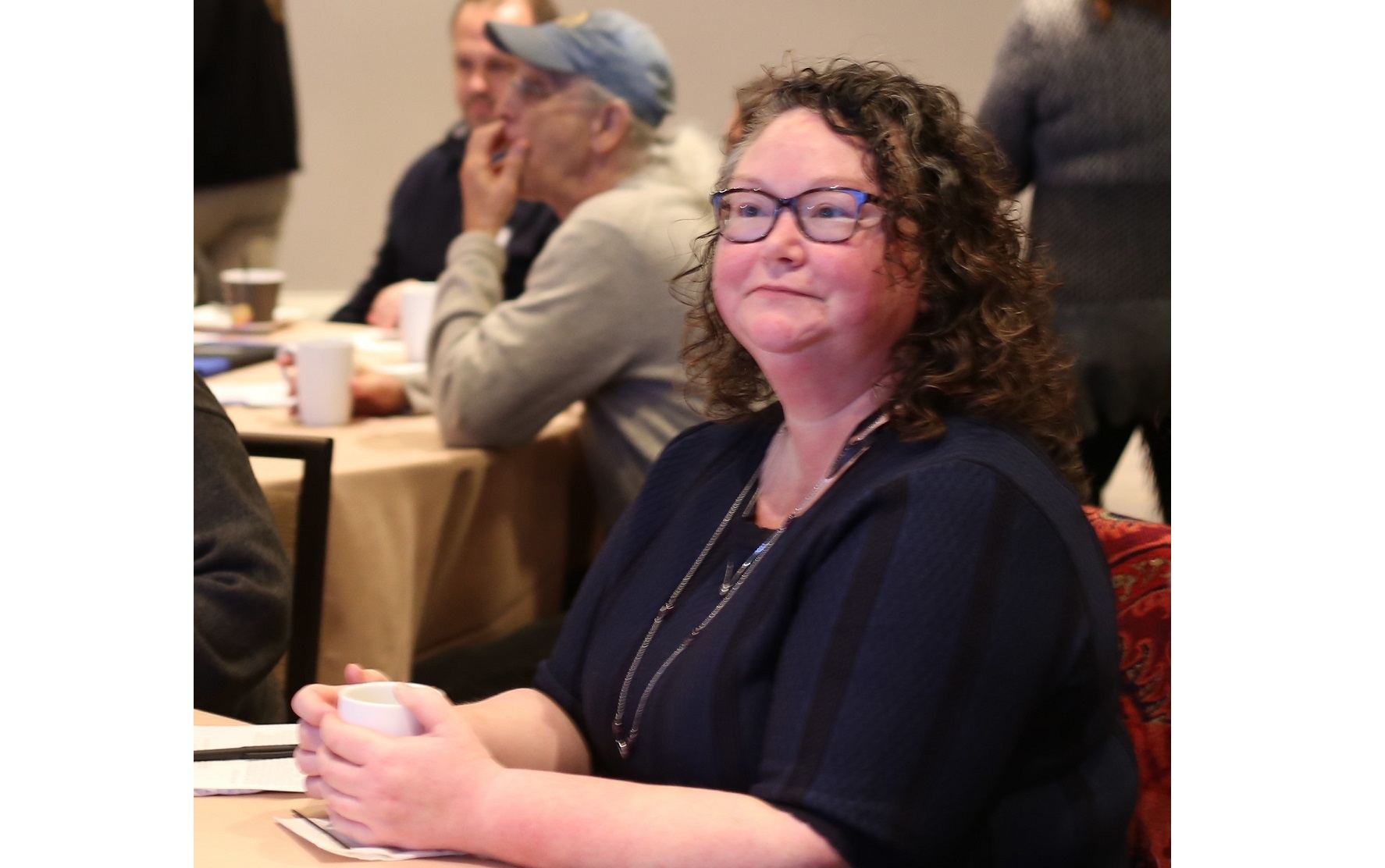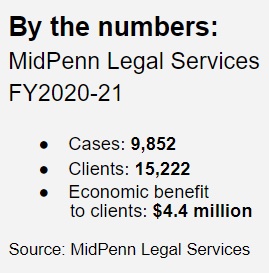
The coronavirus pandemic has been a busy time for MidPenn Legal Services.
The nonprofit provides professional counsel and representation in civil legal issues free of cost to low-income individuals in 18 counties in central Pennsylvania. Its services include assistance in rent and eviction disputes, unemployment compensation cases and family law — all areas that have been affected by the pandemic's upheavals.
 MidPenn was created in mid-2000 through the merger of four legal aid programs. The oldest of them was founded in 1969, allowing MidPenn to celebrate its 50th anniversary two years ago.
MidPenn was created in mid-2000 through the merger of four legal aid programs. The oldest of them was founded in 1969, allowing MidPenn to celebrate its 50th anniversary two years ago.
Laurie Baughman is MidPenn's deputy director for legal advocacy and managing attorney for the Lancaster office, MidPenn's largest. She is a graduate of the Northwestern Law School of Lewis & Clark College in Portland, Oregon.
One United Lancaster recently spoke with Baughman about MidPenn's activities. The following has been edited for brevity and clarity.
One United Lancaster: Tell me about your professional career. What previous stops did you make along the way to where you are now?
Laurie Baughman: I had worked for MidPenn when I was first graduated from law school, from August of 2000 until April of 2004. I handled a lot of work here in Lancaster around family law. I did unemployment compensation work, and I also was able to handle a couple of appeals.
I really enjoyed doing that, especially when working with victims of domestic violence. The idea of changing the law for the greater good led me then to my next position, which is with the Pennsylvania Coalition Against Domestic Violence. I was there for almost 12 years and then I came back to MidPenn.
In my role as the Deputy Director, I get to do a lot of the systemic quality assurance work in terms of working with the advocates across our entire program. Then I also have my management duties.
I'm not primarily a case handler, but I do cover cases for when different staff need leave. I fill in and cover the phone as well as do administrative stuff in terms of management and evaluating staff and assigning cases.
A large part of what I did when I was at the Coalition Against Domestic Violence was training attorneys around representing victims of domestic violence and understanding the laws that were there to benefit victims. I was sort of in the background on a lot of cases, helping individual attorneys strategize and work through legal research.
OUL: What can you tell me about MidPenn Legal Services?
Baughman: MidPenn has a total staff of around 100 employees. We go from Reading all the way west to Clearfield; as far north as Schuylkill County in Pottsville; and (as far west as) Gettysburg, serving Adams and Fulton County.
 (In Lancaster) we have, including myself, nine attorneys, two paralegals, and right now one support staff. We've been desperately searching for a second support staff person.
(In Lancaster) we have, including myself, nine attorneys, two paralegals, and right now one support staff. We've been desperately searching for a second support staff person.
Three of our staff are Spanish to English bilingual. ... We are able to serve clients who speak any language. We work with Language Line to make sure that we have the capability of reaching out, and the courts are required to provide interpreters when somebody is bilingual or is limited in English proficiency.
Our biggest goal is to help people stay safe, stay stable in terms of their income, and in their families, and then to access resources that they may not otherwise be able to obtain.
OUL: The pandemic has introduced some new challenges to the nonprofit world. What are some that MidPenn is currently facing?
Baughman: It's been an incredibly challenging world during the pandemic. We had these great (eviction) moratoriums put in place, but in order to take advantage of that, there was this CDC declaration that had to be put in place, and so lot of hard work. [We’ve] done a number of collaborative educational pieces with Tenfold and the housing authorities to make sure that people are aware of their rights and to try to keep landlords apprised of what they need to do.
We've had a lot of unemployment compensation work. Sometimes it wasn't even that they were being denied, it’s just they couldn't get information about where their claims were. ... We were just trying to help them navigate this incredible bureaucracy, to be able to figure out: Do they need to do anything else, and when can they start getting their money?
We've started to see an uptick in family law as well, just because I think having (virtual at-home schooling), there's just a lot more that people, as the custodial parent, have to navigate, and so there's a lot more we're seeing.
And then the child tax credits that came out; having people navigate which parent gets that, some of that is lending itself to seeing more cases.
We never closed our doors, except for a very short period at the beginning of the pandemic when we got ourselves situated to be able to work remote. While we aren't open to the public to just walk in, we are taking clients by appointment and most of our staff is in the office at least several days a week. We are back in court. We are representing clients. That's a big thing that we want to make sure people know.
OUL: Getting help to the people who need it is always a challenge. How do people find out about you in the first place?
We try our hardest to keep up with all of our allies in the community, and make sure other stakeholders who work with the populations that we work with are aware of the services we provide. I participate in the housing service provider network meetings. We've done a number of presentations in that setting, so all of the folks who are working within that forum are aware of what we do.
We have social media presence on Facebook and Twitter, and our website (www.midpenn.org) all provide information. We were recently involved in a radio program through SACA. The Department of Human Services will list us as a place people can consult. The (Lancaster County) courthouse has brochures for our services in the Prothonotary's office.
Lancaster County has a self-help center within the courthouse where certain kinds of court actions are in packet form, with instructions and the actual forms that need to be completed, so people can try to file on their own. We have our brochures in that office. The Bar Association has our information, and they refer folks over to us a lot. Some of the MDJs (magisterial district justices) are aware of us and might send folks to us.
OUL: Any future plans or goals for MidPenn?
Baughman: It would be nice if MidPenn wasn't necessary; that everyone had the same opportunities and ability to get access to justice, but I don't foresee that in the near future, at least in my lifetime. So, I think we plan to be here and going strong.
I'd like to see an end to poverty, but I don't know that that's something I can do all by myself. Although we all are in partnership trying our best, right? I think we just want to be able to continue to provide high quality legal representation to those who need it.
We try to do periodic needs assessments so that we stay in tune with what the needs in the community are in terms of the legal representation, so we provide services where our folks in the community need it most. You could say a future goal is to be continually present for folks who need our services. It’d be great if we didn't need protection orders; if we didn't need to be in housing court because people are being evicted. But unfortunately, we're not there yet.
OUL: You started out in environmental law. What caused the switch in interest?
Baughman: You know, you have multiple views of the world and what you want to do, and sometimes it's hard to narrow it down. ...
I love our natural world and so that was sort of a big push to why I ended up going to the law school that I went to. But for college, I went to Penn State, and I worked with the local domestic violence shelter doing a lot of work on behalf of victims of domestic violence. So, I think I felt like my talents were better used working with individuals, than within the environmental law kind of paradigm where you're representing (for example) why it would be bad to tear down part of this forest.
OUL: Are there activities you enjoy doing outside of your work for MidPenn?
Baughman: I camp. I have a good friend from law school who ended up in Alaska, so I've been to Alaska about four or five times now. It's an amazing state and I know not a lot of people are able to travel outside the Lower 48, so I feel extremely lucky for having had those opportunities.
About Mid Penn Legal Services
MidPenn's clients must meet eligibility requirements: Typically, they must earn no more than 125% of the federal poverty level, or be victims of domestic violence or sexual violence.
Among its services and programs are the following:
• Pro bono representation: Arranged in conjunction with local Bar Associations.
• Low Income Taxpayer Clinic: Legal advice and representation to low-income taxpayers and taxpayers who speak English as a second language in disputes with the Internal Revenue Service.
• Legal Intervention for Victims and Empowerment (LIVE): Free legal representation to survivors of domestic and sexual violence in protection orders, family law, housing and expungement. Offered in 11 counties, including Lancaster.
Employment Law: Assisting individuals in overcoming barriers to employment, including expungement or sealing of criminal records and securing pardons.
• Public Benefits: Free representation to individuals applying for public benefit programs.
• Securing Economic Rights for Victims with Disabilities (SERV'D): Representation of victims disabled as the result of a crime who are seeking Social Security disability benefits. Offered in seven counties, not including Lancaster.
Source: MidPenn Legal Services





